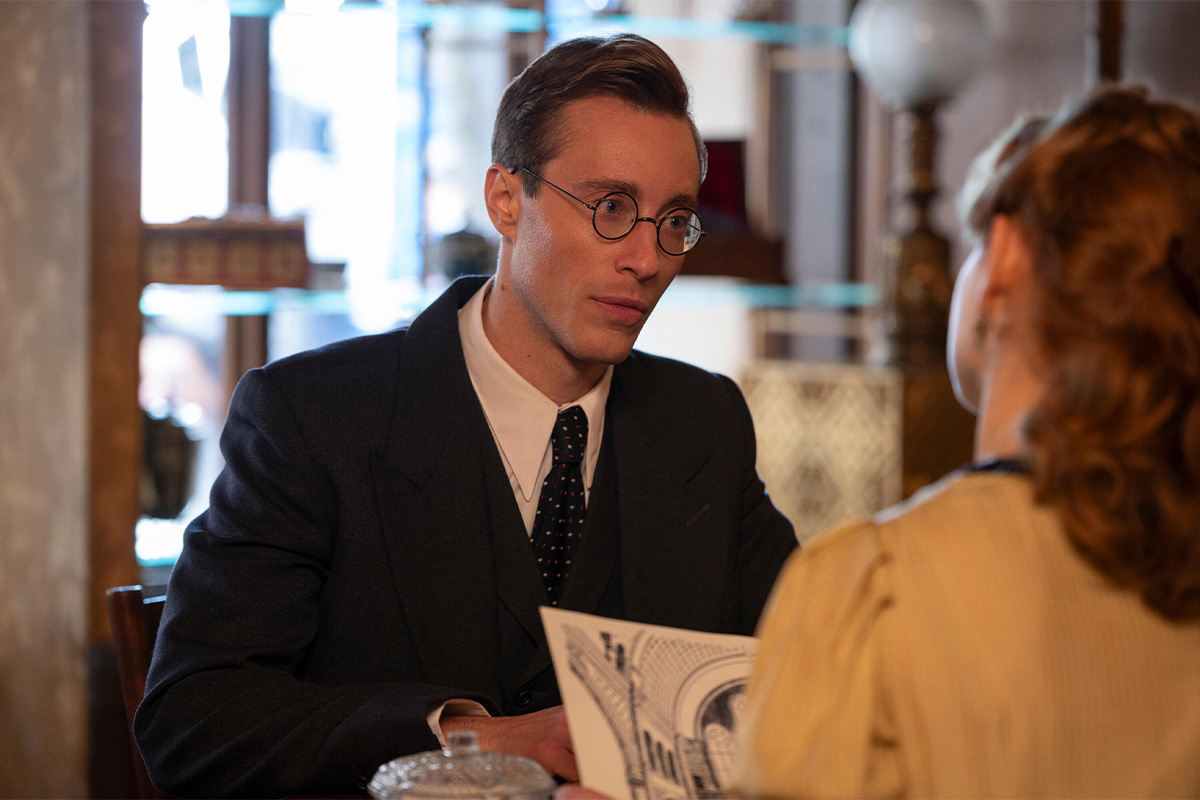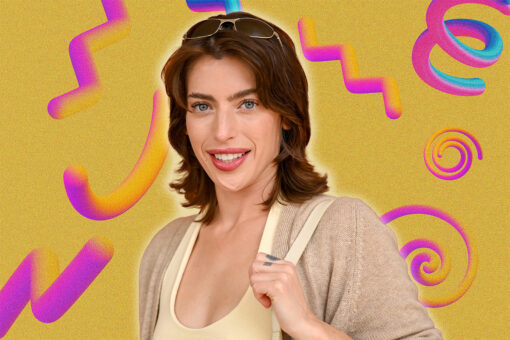Spoilers ahead for Hulu’s “We Were the Lucky Ones.”
Sam Woolf could’ve easily gotten lost in the shuffle in “We Were the Lucky Ones.” As part of an all-Jewish ensemble featuring veteran performers Robin Weigert and Lior Ashkenazi, Hollywood darlings Logan Lerman and Joey King and popular Israeli actors Amit Rahav, Hadas Yaron and Michael Aloni, a lesser performer might’ve wilted and dried up on screen. Not so with Woolf. On the contrary, I believe it’ll be the British Jewish actor’s breakout performance.
“We Were the Lucky Ones,” adapted from Georgia Hunter’s novel of the same name, tells the true story of the Polish Jewish Kurc (pronounced Koo-rtz) family. In 1938, the Kurc family celebrates Passover together in their hometown of Radom, but they are separated shortly after the onset of World War II and the Holocaust. From the Radom ghetto to a prison work camp in Siberia to ocean liners to Casablanca and Rio, the miniseries follows the heads of the family Sol (Ashkenazi) and Nechuma (Weigert) and their children Genek (Henry Lloyd-Hughes), Mila (Yaron), Addy (Lerman), Jakub (Rahav) and Halina (King) as they fight to survive and reunite.
The whole show and each performance cuts deep into the collective memory and scar tissue of the Holocaust. But perhaps none so much as Woolf’s portrayal of Adam Eichenwald. Adam is Halina Kurc’s boyfriend and later husband, who joins the Polish resistance. As Adam, Woolf broadcasts humility, dignity and resolve in the face of dehumanization by the Nazis, working hard to find places for Jews to hide and becoming an expert in making fake ID papers. He’s even able to be charming in moments of high stress. In one scene Adam convinces his landlady that he’s not Jewish through an exceedingly clever method I won’t spoil for you, though it’s Woolf’s effortlessly cool affect that really sells the moment. And, of course, in the moment that Adam finally breaks down, the reality of the Holocaust becomes all too devastating and too close for the viewer.
Sam Woolf recently chatted with Hey Alma via phone about “We Were the Lucky Ones,” the out-of-body experience he had filming and visiting where his family is from in Poland.
This interview has been lightly edited and condensed for clarity.
First, could you talk about what being in “We Were the Lucky Ones” and playing Adam has meant to you as a Jewish person and actor?
Jobs like this don’t come around very often, to be honest. It’s so close to my heart and so close to my family. When I found out I got the job, I went to Łódź in Poland, which is where I found out my whole family are from. And that is an hour’s drive from where Georgia’s family are from in Radom, where they escaped from. It was just eerily close. When we were there, my mom said, “This wasn’t your story. But it could have been.” That really stuck with me.
And I mean it was a privilege. You just hope you do… justice is a funny word, “to do justice to it.” But it’s the closest one that I’ve got. Because you feel a sense of responsibility and connection, and as a Jewish person I feel that history in my bones, in my DNA. It does something strange to you — without waxing too much on the idea of intergenerational trauma and things like that. It’s just within your family. It’s within your history. It was a real honor, without sounding too trite, to be part of it.
Was the experience made more meaningful by the fact that all of the main cast is Jewish?
Yeah. And I think a majority of the creators, or a very large number of creators are Jewish as well. It’s hugely meaningful and it’s very rare to be in a room with almost everyone being Jewish.
How involved was Georgia Hunter in the process of filming? Did you get a chance to speak with her about Adam or the Kurc family more generally?
Georgia was with us loads of the time. She was a member of the cast in a way. So we would have dinners regularly and we would all talk about her family, our individual characters and we really got a sense of them as people. You really never get that as a resource when you’re doing a story which really happened. So it was incredible. It also meant that regularly we would get kind of hit with this sense of… you’re doing a day and you’re in costume and at set and it’s fine, and you’re connecting to the scene. And then sometimes if Georgia was there, you also go “Oh, God, this is your great-uncle. That’s your grandfather.” It really, really hits specific, emotional buttons.
Yeah, absolutely. For me, one of the most compelling moments of the entire show is in the last episode when Adam returns from discovering that his entire family has been murdered. He questions his work in the resistance because he couldn’t save his family. And when Bella reassures him, his response is,”What do I do with that?” Which is just really, really poignant. How did you get into that headspace?
Well, without giving any spoilers: It was hard. I think that was probably the hardest scene I’ve ever shot. Certainly one of them. I didn’t know how it was gonna be. I had my eye on the calendar. I was like, “OK, that’s going to be that day.” And then it gets closer and closer and you go, “I don’t exactly know how that’s gonna feel.” On the day, it was a floodgate. It felt like a slightly out of body experience. Then when it was done, it’s like, I don’t know quite how that happened. Also Eva Feiler was my partner in that scene, and I think is an absolutely extraordinary actress. She was a huge part of that scene for me, because there’s something about being witnessed in the extremity of pain like that that made it even more emotional. And I could feel her, I could feel her character’s empathy. And that, I think, was one of the most powerful things.
I thought it was really special, too, because her character is one of the only people related to the Kurc family — that we know of in that scene — who lost her own family. Her character understands perhaps on a deeper level what Adam is going through than even Halina would at that moment.
Totally, totally. I thought it was very beautiful and true to life that for the partners — I’m pretty sure all of the partners — their families outside of the Kurc family experience great, great, great loss. You have a really important contrast, particularly in that moment. Again, spoilers in terms of what happens. But in moments where sometimes there’s a great reunion or joy for the group, it’s also a great loss for some of the other characters. I think it’s important dramatically to have that contrast.
The final Passover Seder when everyone’s recounting names of people they lost really blew me away. It’s so, so many names. That moment really just highlights how unusual it is that all the members of the Kurc family survived.
It’s extraordinary.
On that, Passover really grounds the show. The first episode begins with preparations for Passover in 1938, and then there’s the 1939 seder. And then again, Passover comes up at the end. Is Passover something that you did growing up with your own family?
Yeah, it was. I’m the youngest of three, so I did the Ma Nishtana.
Me too. I still do it every year.
Really? That’s great. Passover now isn’t quite the same way we used to do it, but it will still be a Passover somewhere. It depends on whose house and who’s there. But there will still be a Passover. It’s kind of the only tradition I really do year-on-year, actually. I’m not particularly religious, but I was bar mitzvahed and I used to go to the High Holy Days. And then I kind of grew up and went to university and sort of drifted away from it. But just to have that sense, once a year, I think is really important.
Absolutely. Because this story is so personal, were cast members inspired to trade stories of their own families on set?
Yeah, very much. Everyone in that room had some kind of personal connection. And so it was very palpable. And particularly if you do a hard scene or other people do a hard scene, things would come up and you’d feel the need to discuss them and have a hug, have a cry, have a glass of wine together. Just sort of sit with each other in pain or grief or memory. Luckily, we care very deeply for each other so we could do that for each other.



